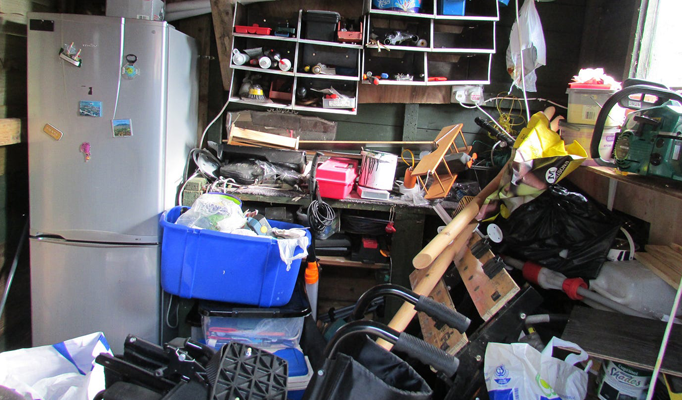
“You’re not moving, are you?” asked one of my neighbours with a concerned look on her face. “No, I’m just trying to get more organized at home,” I reassured her. But I could see why she thought I might be getting ready to move. Several of our neighbours had left recently, and I had been stacking a number of boxes beside the garage for the next thrift store pickup. That’s when she saw me outside and stopped by to chat.
I’m still not planning to move, but every so often, I have a few more boxes for the thrift store, and every week I have more papers to recycle. A lifetime ago, my husband went to law school, passed the bar and became a lawyer, then decided to go in a different direction. But he had kept all of his law school notes—hand-written, back when taking notes by hand was still a thing, now faded, but still neatly housed in file boxes. After the third anniversary of his passing, I decided it was time to let those old notes go. In my attempts to get my household in order, I’m reminded of these words from Ecclesiastes: “There is a time for everything, and a season for every activity under the heavens. . . a time to keep and a time to throw away” (3:1, 6)—or in my case, a time to recycle or donate to a thrift store.
I wonder though, beyond this general observation, are there some biblical principles for decluttering, for what to keep and what to cast off? I’d seen some articles online about a Christian perspective on decluttering, and there was even a decluttering webinar offered for Christian women. But is decluttering only for women? Don’t we all accumulate things, and in time need to let some things go? And are there some specifically Christian principles for decluttering, or is that over-spiritualizing a physical, practical reality of life?
In Scripture, human beings are described as both body and soul, made from dust and filled by God with the breath of life (Genesis 2:7). We are “soul and body” (Psalm 31:9), “whole spirit, soul and body” (1 Thessalonians 5:23), “heart . . . soul . . . mind . . . and strength” (Mark 12:30). The disposition of our souls affects our bodies – inward anxieties can make our hearts race. And what we do with our bodies outwardly affects us inwardly—at least for me, when I eat too much of the wrong foods, I often feel disturbed in spirit too. So, I don’t think it’s over-spiritualizing to look for biblical guidance in decluttering. It’s simply a recognition that our lives are both physical and spiritual, that God cares for our whole lives as whole people. That’s a good, first, basic principle for everything we say and do. All of life – including any decluttering –is part of our life with God.
A second basic principle is that life is not mainly about things. As Jesus taught in his sermon on the mount, life is more than food, and the body is more than clothing (Matthew 6:25ff.). At the same time, we also need to realize that things are not mainly about the things themselves. Food is not only to nourish our bodies. Food is also celebration, comfort, and art. Food builds families, communities, and cultures. In a similar way, things hold memories, can evoke strong emotions, and help to remind us who we are. Professional organizer Marie Kondo was not wrong in asking her clients, does this particular item spark joy? As we declutter, we would also do well to think about the larger significance of the things in our lives. Have they outlived their purpose? Is it time to pass them on to make room for something new? Can they be used to bless someone else?
A third basic principle is to think not only of decluttering our outward physical space, but to consider also decluttering our souls. If you’ve given up multi-tasking, social media, or something else in this season of Lent, you know what I mean. By giving up multi-tasking, you declutter both your outward busyness and your inward sense of stress. By giving up social media, you give up distraction inwardly and make space for people outwardly in real time. But decluttering our souls is not only for the few weeks of Lent. It’s for any time of year. As Ephesians 4:31 encourages us, we are to put off “all bitterness, rage and anger, brawling and slander, along with every form of malice.” In contrast, Philippians 4:8 reminds us: “whatever is true, whatever is noble, whatever is right, whatever is pure, whatever is lovely, whatever is admirable, if anything is excellent or praiseworthy, think about such things.”

Leave a Reply